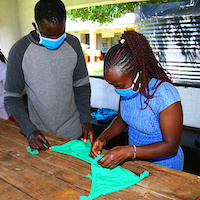My placement in Londiani - blog one by Darragh Treacy
In a series of blogs, student Darragh Treacy is sharing his experiences of working on a placement with Friends of Londiani and his recent trip to support our work in Kenya.
Blog One - People and Projects
As part of my four year International Development & Food Policy course in University College Cork (UCC), I am currently on a six month placement with Friends of Londiani, an Irish NGO based in Midleton, Cork and Londiani, Kenya. For the most part, I have been based in the Midleton office, but on the 9th of May I went out to Londiani.
In my relatively short time here, I have already seen and learnt a lot about the various projects and programmes Friends of Londiani implement in Londiani and its surrounding areas, all of which aim to improve the livelihoods of these communities. FOL have projects running in many areas such as health, education, economic empowerment and tourism. Some of their bigger programmes include ‘Girls 4 Girls’ which aims to reduce days of school missed by girls who have their period but don’t have access to sanitary pads. As a result of this, many girls miss up to one week per month of school. Girls 4 Girls focuses on providing sanitary pads for all girls attending school and ensuring that they are easily accessible. In this way, the programme helps to keep girls in school and so enhance their prospects for a decent living in the future.
Another interesting project facilitated by FOL is their ‘stove building’ programme. This focuses mainly on providing households with appropriate stoves but also expands to larger scale operations such as schools. Many households in the area use a traditional ‘3 stone’ stove which is primitive and can be detrimental to the health of the household. This style of stove consists of three stones with a pit in the centre, when lit, it generates huge volumes of smoke. In some houses, these may be located in the main living building and so all occupants are subjected to inhaling smoke, creating respiratory illnesses amongst others.
FOL have trained many people to be stove installers to combat this and are responsible for well over 100 stoves being fitted to date. These stoves are designed so that the smoke released by them is drawn away from the opening and out through an adjoining chimney, resulting in little or no smoke being allowed to fill the room where it is located. Data collection regarding the success of this project is ongoing, however, on first glance the new design is benefitting these households and is reducing the episodes of serious respiratory and other illnesses reported.
Maternal Health
One of the most interesting and important projects which I’ve seen since arriving in Londiani is the provision of a ‘Maternal Health Shelter’ in the local Londiani Sub-County Hospital. The construction of this facility was funded by FOL and Irish Aid and building was completed in March 2015. This facility is sure to save the lives of many women and children.
As is tradition, many women choose to give birth at home as that is what their mother and grandmother before them have done. If there are no complications then this isn’t an issue. However, if something goes wrong during labour, women often cannot access urgent medical assistance due to the poor road infrastructure seen here. This means that many potentially avoidable deaths are occurring due to the lack of professional input during birth. (It’s worth noting here that some women don’t seek medical services for pregnancy for other reasons, such as being relied on to collect water in the household or in some cases the embarrassment of arriving to a hospital dirty).
And so, Maternal Health Shelters help to combat this huge issue. In Londiani, the shelter is built within the hospital grounds. Inside are six bunk-beds, allowing for the woman and a family member if desired to stay, these people are also provided with meals from the hospital. This means that if anything goes wrong during labour, a medical professional and the essential equipment are at hand to help ensure no lives are lost as a result, either to the mother or her child. On top of this, the provision of the shelter ensures that women attend ante and post natal check-ups which has been the cause of many deaths in the past.
In the coming years, the introduction of these Maternal Health Shelters in various hospitals should greatly reduce the numbers of maternal and neo-natal deaths that are caused by complications in home birthing and the barriers such as poor road infrastructure in allowing a woman reach a hospital in times of need.
To read Darragh's next blog follow this link>>

